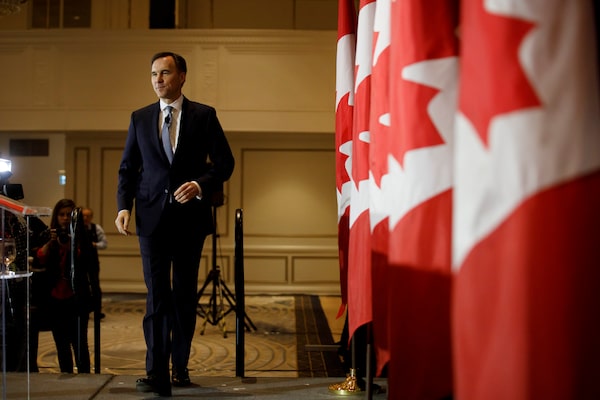
Finance Minister Bill Morneau takes the stage to address a business audience in Toronto, on March 6, 2020.Cole Burston/The Canadian Press
Finance Minister Bill Morneau says he is working on a “practical and prudent” federal budget that will preserve room for stimulus to deal with the uncertain fallout from COVID-19.
Mr. Morneau told a business audience in Toronto the government is still looking at a range of possible policies to help support individuals and businesses affected by the outbreak. Meanwhile, he said the budget would set aside a larger-than-usual risk adjustment provision – funds built in each year as a contingency for unforeseen events – to ensure the government is prepared to act if necessary.
The government’s fiscal projections currently include an adjustment for risk of $3-billion a year.
Andrew Coyne: A coronavirus recession could mean a fearful reckoning
Coronavirus guide: The latest news on COVID-19 and the toll it’s taking around the world
‘Isn’t the flu worse?’ And other coronavirus questions answered by André Picard
The minister restated his pledge to reduce the size of the federal debt as a share of GDP, and stressed that the federal balance sheet is strong, giving the government flexibility to respond as the impact of the coronavirus evolves.
“You have a great balance sheet because sometimes there are rainy days,” he said. “It’s a rainy day.”
Mr. Morneau said the government will use some of this “fiscal firepower” if the COVID-19 outbreak causes the economy to deteriorate substantially.
“Should we find ourselves in a challenging situation, we need to deal with it. It’s not being imprudent in any way in our budgetary decisions – let’s recognize that we may need to make investments,” he said. “I want Canadians to know that we are ready and able to make those investments, should the situation warrant.”
Mr. Morneau said support for Canadians quarantined as a result of the virus will be announced shortly.
Budgets typically take place in late winter or early spring, but an official date has not been announced.
Avery Shenfeld, chief economist at Canadian Imperial Bank of Commerce, said Mr. Morneau’s comments signal a budget that won’t contain a “big fiscal boost" to combat the economic effects of COVID-19 – but that a stimulus package “could come later if necessary.”
“This is a rapidly evolving story, and budgets, unfortunately, take weeks to prepare,” Mr. Shenfeld said by e-mail. “So if there’s a need for a significant fiscal shift, it would come post-budget at this point."
The Parliamentary Budget Officer has calculated that the federal government has room to cut taxes or increase spending by as much as $41-billion a year without increasing the debt-to-GDP ratio over the long term.
However, the Conservative opposition dismissed Mr. Morneau’s talk about a reserve of fiscal firepower, saying that the Liberals have run much larger deficits than planned, and abandoned their 2015 election promise to balance the books.
“Now the cupboard is bare,” Conservative MP Pat Kelly said in a statement.
Speaking with reporters, Mr. Morneau suggested the government can move ahead with its plans for a climate-focused budget based on the Liberal Party’s 2019 campaign promises and still deal with the fallout from the virus and recent rail blockades.
“I am confident that we can both continue on our path and address this challenge, because of our strong fiscal starting point," he said.
Goldy Hyder, president and chief executive officer of the Canadian Business Council, is among several business leaders telling the Finance Minister the current economic situation calls for a different budget than the government had in mind.
Instead of an “environmental crisis budget ... this budget has got to reflect the urgency with which we need to address the economic shocks that we’re facing and the need for a plan and strategy going forward. This has to be a budget that emphasizes the economy first,” Mr. Hyder said.
Canadian Chamber of Commerce President Perrin Beatty echoed the sentiment. “What we have now is a business climate emergency that needs to be addressed in the budget," he said.
At the same, Mr. Morneau faces calls from members of the Liberal caucus to deliver on the party’s climate promises.
“If there are ways we can address short-term economic shocks, we should, but we shouldn’t do so at the expense of taking the long view and tackling climate change,” Liberal MP Nathaniel Erskine-Smith said.
In his speech, Mr. Morneau reaffirmed the government’s commitment to its carbon plan as a cornerstone to its longer-term economic strategy.
“We need to position Canada as a global leader,” he said. “We have to work with the sectors of our economy that are heavy carbon emitters. There is no path forward for Canadian businesses that doesn’t include reducing their carbon emissions - investors just won’t be there.”
With a report from Marieke Walsh in Ottawa
Your time is valuable. Have the Top Business Headlines newsletter conveniently delivered to your inbox in the morning or evening. Sign up today.
Bank of Canada Governor Stephen Poloz says that while there's little monetary policy can do to lessen the economic impact of COVID0-19, lowering interest rates could help cushion families with mortgages as alarm over the new coronavirus grows.
The Globe and Mail